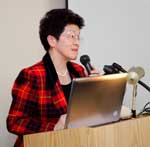CSW55 Parallel Event 2011
Improving Education for Women and Girls in Science and Technology
CYNTHIA SHIBUYA AND MERLY BARLAAN
FEBRUARY 23, 2011 - UN CHURCH CENTER, NEW YORK
CSW55: WFWPI Parallel Event
Speakers:
Ms. Sachiko Mori, Vice Project Director, WFWP School Project in Kenya
Dr. Gita Bangera, Microbiologist and Instructor at Bellevue College, Bellevue, WA, Founder of the ComGen Project, Authentic Research Experiences for Undergraduate Students
Ms. Lily Lin, President, National Alliance of Taiwan Women's Association
Ms. Karen Smith, Vice Chair of the Alliance of NGOs on Crime Prevention and Criminal Justice and Founder of the NGO Academy
Moderator: Ms. Bonnie Berry, UN Representative, WFWP International
In a gathering of 100, that had standing-room only, Ms. Sachiko Mori opened the session with her moving slide presentation on the Handow Secondary School located in rural Marakusi village 400 miles from Nairobi, Kenya. In 1998, the Handow Secondary school opened officially with an enrollment of 45 students. The school built a science lab for students to fully experience science in practice, not just in theory, creating excitement in the pursuit of careers in science and technology. Ms. Mori described the culture in rural areas as still heavily emphasizing education for boys, and expectations of girls to focus on duties within the home, i.e. cooking and gathering water, etc. Tuition-free education at Handow School has allowed an increase of girls' participation in education. Because of free enrollment there are now over 360 boys and over 280 girls in ten classrooms and two Science labs. The government requested the second lab to be built because of the increase in enrollment. It is very remarkable to have two laboratories in a rural area school. Educating girls in the field of science has resulted in many girls pursuing careers in medicine.
Dr. Gita Bangera gave a very exciting report on her innovative teaching strategy for undergraduate level science students. Her U.S. National Science Foundation funded project provides opportunities for community college students to conduct research for a USDA research study. Dr. Bangera conducts her class similar to a graduate level class. Rather than the instructor driven lecture/study method of instruction, students start immediately in the research project and get involved in the problem-solving process, generating the student's creativity and abilities. It is a whole new teaching dynamic that has been highly effective, stimulating greater interest and involvement. Students have the opportunity to meet and interact with the scientists leading the research study and begin to associate themselves within the scientific research community. Some students have participated in six week summer internships in research labs alongside these leading researchers. Alumni of this class, particularly women students, experience a much stronger self-image with regard to their confidence in conducting scientific research as well as a stronger vision of themselves as scientists. Dr. Bangera's style of "thinking outside the box" generated much excitement among workshop participants.
Ms. Lily Lin spoke on efforts in Taiwan by a coalition of women's organizations for engaging high school girls in science and technology education and career pathways. She identified old attitudes in Taiwan that "the woman's place is in the home" as a major obstacle in engaging more girls in science and technology careers. This tradition is still very strong in Taiwan. To combat this, the Taiwan Women's Alliance initiated conferences, symposiums and speaking tours aimed at high school girls to promote understanding about careers in science and technology. Other best practices that the Alliance initiated are: computer and internet application training courses for girls and women, speeches and remarks from women leaders in science and technology were compiled into a book which was distributed to high school students. Ms. Lin told a story about a Taiwanese woman who after her divorce, tried to make bread for a living but was not able to sell enough bread to be successful, even though the bread was very tasty. After attending a course on the internet and social networking, the woman created her own blog about her products and now has a thriving business with her now famous "breathing bread."
Ms. Karen Smith gave a compelling presentation using physics analogies to demonstrate the need for effective strategizing and advocacy to gain real results. Essentially she posed the idea that just stating your needs over and over does not always result in having those needs met. One idea of an effective strategy to gain government and UN support to develop science and technology education for girls is for NGOs to send representatives to intern at the UN to gain advocacy skills and experience. Having that international advocacy experience on one's resume gives greater credibility and a stronger, more effective voice when bringing issues up to national or local governments. The combination of a strong resume and advocacy skills lends power and authority to voices of advocates for girls' educational development.
All in all, this was a very powerful and exciting workshop with many best practices presented. Participants left feeling empowered with new ideas and strategies for furthering the cause of developing the area of science and technology education for girls.





